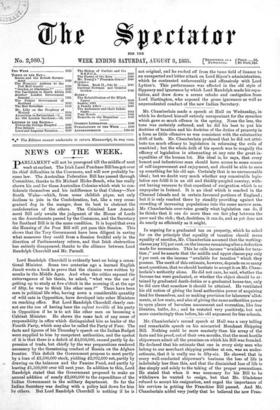In arguing for a graduated tax on property, which he
asked for on the principle that equality of taxation should mean equality of sacrifice, Mr. Chamberlain assumed that the working- classes pay in per cent, on the income remaining after a deduction made for necessaries. This he calls income "available for taxa- tion ;" and he asserts that the middle and upper classes pay only 6 per cent, on the income "available for taxation" which they possess. The merit of this estimate, however, depends on so many moot questions, that we should hesitate to accept it on Mr. Cham- berlain's authority alone. He did not care, he said, whether the Income-tax were graduated, or whether the object should be at- tained by graduated death-duties or a graduated house-tax, only he did care that somehow it should be attained. He ventilated his old notion of giving the local authorities power of acquiring land for themselves, and so making provision for labourers' allot- ments, at low rents, and also of giving the same authorities power to open places of harmless amusement and recreation, like free libraries, baths, &c.; and he restated very positively, but not more convincingly than before, his old argument for free schools.


































